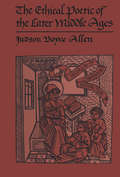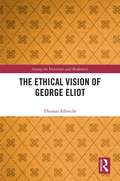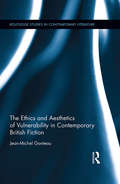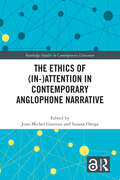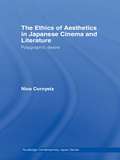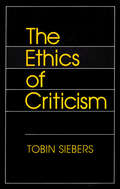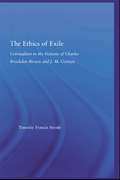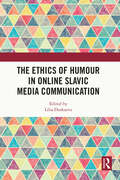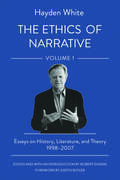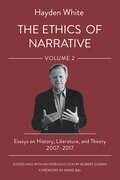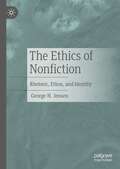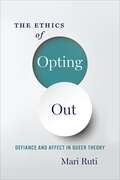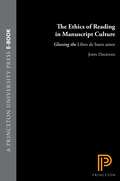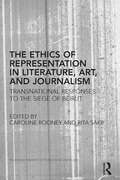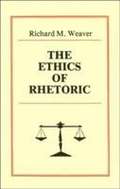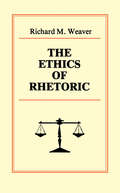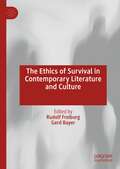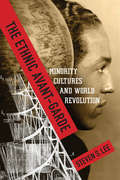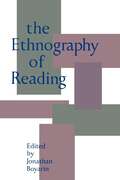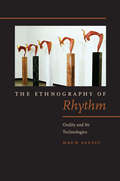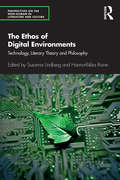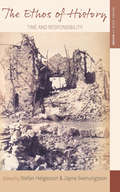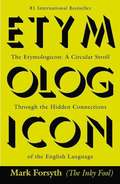- Table View
- List View
The Ethical Poetic of the Later Middle Ages
by Judson Boyce AllenThis study of the definition of literature in the late medieval period is based on manuals of writing and on literary commentary and glosses. It defines a method of reading which may now profitably explain medieval texts, and identifies new primary medieval evidence which may ground and guide new reading. Allen chooses texts whose commentary tradition provides the greatest opportunity for completeness. The most important of these is Ovid's Metamorphoses. Medieval readings of Ovid bring into focus a number of major literary questions--the problems of fable and fiction, of unity imposed by miscellany poetry, of allegorical commentary, and of Christian use of pagan culture--all in connection with text which furnished medieval authors with more stories than any other single source except possibly the Bible. Allen also studies commentaries on the Consolation of Philosophy of Boethius, the Thebaid of Statius, the De nuptiis of Martianus Capella, the medieval Christian hymn-book, and the Poetria nova of Geoffrey of Vinsauf. Together these texts represent the range of medieval literature--a literature which, Allen concludes, was taken as direct ethical discourse, logically conducted and artfully organized within a system of language that also assimilated the natural world and sought to absorb its audience.
The Ethical Vision of George Eliot: Communion and Difference (Among the Victorians and Modernists)
by Thomas AlbrechtThe Ethical Vision of George Eliot is one of the first monographs devoted entirely to the ethical thought of George Eliot, a profoundly significant, influential figure not only in nineteenth-century English and European literature, nineteenth-century women’s writing, the history of the novel, and Victorian intellectual culture, but also in the field of literary ethics. Ethics are a predominant theme in Eliot’s fictional and non-fictional writings. Her ethical insights and ideas are a defining element of her greatness as an artist and novelist. Through meticulous close readings of Eliot’s fiction, essays, and letters, The Ethical Vision of George Eliot presents an original, complex definition of her ethical vision as she developed it over the course of her career. It examines major novels like Adam Bede, Middlemarch, and Daniel Deronda; many of Eliot’s most significant essays; and devotes two entire chapters to Eliot’s final book Impressions of Theophrastus Such, an idiosyncratic collection of character sketches that Eliot scholars have heretofore generally overlooked or ignored. The Ethical Vision of George Eliot demonstrates that Eliot defined her ethical vision alternately in terms of revealing and strengthening a fundamental human communion that links us to other persons, however different and remote from ourselves; and in terms of recognizing and respecting the otherness of other persons, and of the universe more generally, from ourselves. Over the course of her career, Eliot increasingly transitions from the former towards the latter imperative, but she also considerably complicates her conception of otherness, and of what it means to be ethically responsible to it.
The Ethics and Aesthetics of Vulnerability in Contemporary British Fiction (Routledge Studies in Contemporary Literature)
by Jean-Michel GanteauThis book visits vulnerability in contemporary British fiction, considering vulnerability in its relation to poetics, politics, ethics, and trauma. Vulnerability and risk have become central issues in contemporary culture, and artistic productions have increasingly made it their responsibility to evoke various types of vulnerabilities, from individual fragilities to economic and political forms of precariousness and dispossession. Informed by trauma studies and the ethics of literature, this book addresses such issues by focusing on the literary evocations of vulnerability and analyzing various aspects of vulnerable form as represented and performed in British narratives, from contemporary classics by Peter Ackroyd, Pat Barker, Anne Enright, Ian McEwan, and Jeanette Winterson, to less canonical texts by Nina Allan, Jon McGregor, and N. Royle. Chapters on romance, elegy, the ghost story, and the state-of-the-nation novel draw on a variety of theoretical approaches from the fields of trauma studies, affect theory, the ethics of alterity, the ethics of care, and the ethics of vulnerability, among others. Showcasing how the contemporary novel is the privileged site of the expression and performance of vulnerability and vulnerable form, the volume broaches a poetics of vulnerability based on categories such as testimony, loss, unknowing, temporal disarray, and performance. On top of providing a book-length evocation of contemporary fictions of vulnerability and vulnerable form, this volume contributes significantly to considerations of the importance of Trauma Studies to Contemporary Literature.
The Ethics of (Routledge Studies in Contemporary Literature)
by Susana Onega Jean-Michel GanteauThis volume argues that contemporary narratives evince a great deal of resilience by promoting an ecology of attention based on poetic options that develop an ethics of the particularist type. The contributors draw on critical and theoretical literature hailing from various fields: including psychology and sociology, but more prominently phenomenology, political philosophy, analytical philosophy (essentially Ordinary Language Philosophy), alongside the Ethics of Care and Vulnerability. This volume is designed as an innovative contribution to the nascent field of the study of attention in literary criticism, an area that is full of potential. Its scope is wide, as it embraces a great deal of the Anglophone world, with Britain, Ireland, the USA, but also Australia and even Malta. Its chapters focus on well-established authors, like Kazuo Ishiguro (whose work is revisited here in a completely new light) or more confidential ones like Melissa Harrison or Sarah Moss.Chapter 2 of this book is freely available as a downloadable Open Access PDF at http://www.taylorfrancis.com under a Creative Commons [Attribution-Non Commercial-No Derivatives (CC-BY-NC-ND)] 4.0 license.
The Ethics of Aesthetics in Japanese Cinema and Literature: Polygraphic Desire (Routledge Contemporary Japan Series #Vol. 10)
by Nina CornyetzThis is an innovative, scholarly and original study of the ethics of modern Japanese aesthetics from the 1930s, through the Second World War and into the post-war period. Nina Cornyetz embarks on new and unprecedented readings of some of the most significant literary and film texts of the Japanese canon, for instance works by Kawabata Yasunari, Mishima Yukio, Abe Kôbô and Shinoda Masahiro, all renowned for their texts' aesthetic and philosophic brilliance. Cornyetz uniquely opens up the field in a fresh and controversial way by showing how these authors and filmmakers' concepts of beauty and relation to others were, in fact, deeply impacted by political and social factors. Probing questions are asked such as: How did Japanese fascism and imperialism ideologically, politically and aesthetically impact on these literary/cinematic giants? How did the emperor as the 'nodal point' for Japanese national identity affect their ethics? What were the repercussions of the virtual collapse of the Marxist movement in the 1960s? What are the similarities and differences between pre-war, wartime and post-war ideals of beauty and those of fascist aesthetics in general? This ground-breaking work is truly interdisciplinary and will appeal to students and scholars of Japanese literature, film, gender, culture, history and even psychoanalytic theory.
The Ethics of Criticism
by Tobin SiebersTobin Siebers asserts that literary criticism is essentially a form of ethics. The Ethics of Criticism investigates the moral character of contemporary literary theory, assessing a wide range of theoretical approaches in terms of both the ethical presuppositions underlying the critical claims and the attitudes fostered by the approaches. Building on analyses of the moral legacies of Plato, Kant, Nietzsche, and Freud, Siebers identifies the various fronts on which the concerns of critical theory impinge on those of ethics.
The Ethics of Exile: Colonialism in the Fictions of Charles Brockden Brown and J.M. Coetzee (Literary Criticism and Cultural Theory)
by Timothy StrodeFirst Published in 2005. Routledge is an imprint of Taylor & Francis, an informa company.
The Ethics of Humour in Online Slavic Media Communication
by Duskaeva LiliaThe Ethics of Humour in Online Slavic Media Communication is devoted to research on how the rules of humour used online media are changing and how these changes rearrange the traditions of speech interaction in media communication. The authors of the book are experienced researchers in the field of Slavic media linguistics and represent five neighbouring countries: Russia, Belarus, Lithuania, Slovakia, and Poland. The research in the volume is based on the data from Slavic languages. The diversity and, at the same time, relative proximity of Slavic languages makes it possible to put separate studies into a wider comparative context, in order to reveal the general and ethno-cultural patterns in using means of communicative etiquette; it helps define the ethno-cultural factors behind the formation of such means. Speech practice of humour creation shows the creative potential of all languages, including the ones with a small number of speakers – Slovak and Belarusian, which have the status of state languages, but are strongly influenced by international languages (English and Russian). This volume is a valuable resource for researchers in the field of Slavic studies.
The Ethics of Narrative: Essays on History, Literature, and Theory, 1998–2007
by Hayden WhiteHayden White is widely considered to be the most influential historical theorist of the twentieth century. The Ethics of Narrative brings together nearly all of White's uncollected essays from the last two decades of his life, revealing a lesser-known side of White: that of the public intellectual. From modern patriotism and European identity to Hannah Arendt's writings on totalitarianism, from the idea of the historical museum and the theme of melancholy in art history to trenchant readings of Leo Tolstoy and Primo Levi, the first volume of The Ethics of Narrative shows White at his most engaging, topical, and capacious.Expertly introduced by editor Robert Doran, who lucidly explains the major themes, sources, and frames of reference of White's thought, this volume features five previously unpublished lectures, as well as more complete versions of several published essays, thereby giving the reader unique access to White's late thought. In addition to historical theorists and intellectual historians, The Ethics of Narrative will appeal to students and scholars across the humanities in such fields as literary and cultural studies, art history and visual studies, and media studies.
The Ethics of Narrative: Essays on History, Literature, and Theory, 2007–2017
by Hayden WhiteThe second volume of The Ethics of Narrative completes the project of bringing together nearly all of Hayden White's uncollected essays from the last two decades of his life, including articles, essays, and previously unpublished lectures. As in the first volume, volume 2 features White's trenchant articulations of his influential theories, as well as his explorations of a wide range of ideas and authors at the frontiers of critical theory, literature, and historical studies. These include the concept of utopia in history, modernism and postmodernism, constructivism, the conceptualization of historical periods such as "the Sixties" and "the Enlightenment," the representation of the Holocaust in scholarly and literary writing, as well as essays on Frank Kermode, Saul Friedländer, and Krzysztof Pomian.
The Ethics of Nonfiction: Rhetoric, Ethos, and Identity
by George H. JensenThis book explores issues of identity, ethics and epistemology that arise around the writing and reception of creative nonfiction. It examines a range of different nonfiction forms – including the personal essay and memoir – and ethical questions that arise in relation to them, such as truth claims, the confessional mode, counter-narratives. Drawing on the ideas of Bakhtin, Nietzsche and Foucault; examples from creative non-fiction writers such as Strayed and Knausgaard; and the founding principles of the originators of the genre, Seneca, Augustine and Montaigne, George Jensen argues that a limited conception of nonfiction leads to a limited view of its ethics. Writing about the truth in an authentic way is more important than ever before – and essential to this is the creation of the ethical subject.
The Ethics of Opting Out: Queer Theory's Defiant Subjects
by Mari RutiIn The Ethics of Opting Out, Mari Ruti provides an accessible yet theoretically rigorous account of the ideological divisions that have animated queer theory during the last decade, paying particular attention to the field's rejection of dominant neoliberal narratives of success, cheerfulness, and self-actualization. More specifically, she focuses on queer negativity in the work of Lee Edelman, Jack Halberstam, and Lynne Huffer, and on the rhetoric of bad feelings found in the work of Sara Ahmed, Lauren Berlant, David Eng, Heather Love, and José Muñoz. Ruti highlights the ways in which queer theory's desire to opt out of normative society rewrites ethical theory and practice in genuinely innovative ways at the same time as she resists turning antinormativity into a new norm. This wide-ranging and thoughtful book maps the parameters of contemporary queer theory in order to rethink the foundational assumptions of the field.
The Ethics of Reading in Manuscript Culture: Glossing the Libro de buen amor
by John DagenaisReexamining the roles played by author, reader, scribe, and text in medieval literary practice, John Dagenais argues that the entire physical manuscript must be the basis of any discussion of how meaning was made. Medievalists, he maintains, have relied too heavily on critical editions that seek to create a single, definitive text reflecting an author's intentions. In reality, manuscripts bear not only authorial texts but also a variety of elements added by scribes and readers: glosses, marginal notes, pointing hands, illuminations, and fragments of other, seemingly unrelated works. Using the surviving manuscripts of the fourteenth-century Libro de buen amor, a work that has been read both as didactic treatise on spiritual love and as a celebration of sensual pleasures, Dagenais shows how consideration of the physical manuscripts and their cultural context can shed new light on interpretive issues that have puzzled modern readers.Dagenais also addresses the theory and practice of reading in the Middle Ages, showing that for medieval readers the text on the manuscript leaf, including the text of the Libro, was primarily rhetorical and ethical in nature. It spoke to them directly, individually, always in the present moment. Exploring the margins of the manuscripts of the Libro and of other Iberian works, Dagenais reveals how medieval readers continually reshaped their texts, both physically and ethically as they read, and argues that the context of medieval manuscript culture forces us to reconsider such comfortable received notions as "text" and "literature" and the theories we have based upon them.
The Ethics of Representation in Literature, Art, and Journalism: Transnational Responses to the Siege of Beirut (Routledge Research in Postcolonial Literatures)
by Caroline Rooney Rita SakrThis transnational collection of essays, interviews, and creative pieces on the 1982 Siege of Beirut explores literary representations of the siege by a diverse set of writers alongside journalism and other media including film and art. The book investigates and promotes an awareness of an ethics of representation on questions of extreme emotional investment, comparing representations of the siege to representations of other traumatic events, visiting responses from those of different cultural backgrounds to the same event and considering implications with respect to comparative approaches. Chapters explore how literature, journalism and art contribute to overcoming the dangers of forgetting and denial, memorial excess and fundamentalism, the radicalization of violence, and the complete breakdown of trust on international levels, asking how they challenge geopolitical, intellectual, and psychological states of siege and instead promote awareness, acknowledgement, mourning, and justice across divided communities. The book extends the use of postcolonial methodologies affiliated with history, international relations, and psychoanalysis (memory, trauma) to Middle-Eastern studies, and visits the siege’s effect on different forms of memory and memorialization: selective memory, trauma, gaps and fissures in historical accounts, recording of eyewitness reports, and artistic re-imaginings and realizations of alternative archives.
The Ethics of Rhetoric
by Richard M. WeaverWeaver's Ethics of Rhetoric,originally published in 1953, has been called his most important statement on the ethical and cultural role of rhetoric. A strong advocate of cultural conservatism, Weaver (1910-1953) argued strongly for the role of liberal studies in the face of what he saw as the encroachments of modern scientific and technological forces in society. He was particularly opposed to sociology. In rhetoric he drew many of his ideas from Plato, especially his Phaedrus. As a result, all the main strands of Weaver's thought can be seen in this volume, beginning with his essay on the Phaedrus and proceeding through his discussion of evolution in the 1925 Scopes "Monkey Trial." In addition, this book includes studies of Lincoln, Burke, and Milton, and remarks about sociology and some proposals for modern rhetoric. Each essay poses issues still under discussion today.
The Ethics of Rhetoric
by Richard M. WeaverWeaver's Ethics of Rhetoric, originally published in 1953, has been called his most important statement on the ethical and cultural role of rhetoric. A strong advocate of cultural conservatism, Weaver (1910-1953) argued strongly for the role of liberal studies in the face of what he saw as the encroachments of modern scientific and technological forces in society. He was particularly opposed to sociology. In rhetoric he drew many of his ideas from Plato, especially his Phaedrus. As a result, all the main strands of Weaver's thought can be seen in this volume, beginning with his essay on the Phaedrus and proceeding through his discussion of evolution in the 1925 Scopes "Monkey Trial." In addition, this book includes studies of Lincoln, Burke, and Milton, and remarks about sociology and some proposals for modern rhetoric. Each essay poses issues still under discussion today.
The Ethics of Survival in Contemporary Literature and Culture
by Gerd Bayer Rudolf FreiburgThe Ethics of Survival in Contemporary Literature and Culture delves into the complex problems involved in all attempts to survive. The essays analyze survival in contemporary prose narratives, short stories, poems, dramas, and theoretical texts, but also in films and other modes of cultural practices. Addressing diverse topics such as memory and forgetting in Holocaust narratives, stories of refugees and asylum seekers, and representations of war, the ethical implications involved in survival in texts and media are brought into a transnational critical discussion. The volume will be of potential interest to a wide range of critics working on ethical issues, the body, and the politics of art and literature.
The Ethnic Avant-Garde
by Steven S. LeeDuring the 1920s and 1930s, American minority artists and writers collaborated extensively with the Soviet avant-garde, seeking to build a revolutionary society that would end racial discrimination and advance progressive art. Making what Claude McKay called "the magic pilgrimage" to the Soviet Union, these intellectuals placed themselves at the forefront of modernism, using radical cultural and political experiments to reimagine identity and decenter the West. Shining rare light on these efforts, The Ethnic Avant-Garde makes a unique contribution to interwar literary, political, and art history, drawing extensively on Russian archives, travel narratives, and artistic exchanges to establish the parameters of an undervalued "ethnic avant-garde." These writers and artists cohered around a distinct form that mirrored Soviet techniques of montage, fragment, and interruption. They orbited interwar Moscow, where an international avant-garde converged with the Communist International. Chapters explore Vladimir Mayakovsky's 1925 visit to New York City via Cuba and Mexico, during which he wrote Russian-language poetry in an "Afro-Cuban" voice; Langston Hughes's translations of these poems while in Moscow, which he visited to assist on a Soviet film on African American life; a futurist play condemning Western imperialism in China, which became Broadway's first major production to feature a predominantly Asian American cast; and efforts to imagine the Bolshevik Revolution as Jewish messianic arrest, followed by the slow political disenchantment of the New York Intellectuals. Through an absorbing collage of cross-ethnic encounters that also include Herbert Biberman, Sergei Eisenstein, Paul Robeson, and Vladimir Tatlin, this book remaps global modernism along minority and Soviet-centered lines, further advancing the avant-garde project of seeing the world anew.
The Ethnic Avant-Garde: Minority Cultures and World Revolution (Modernist Latitudes)
by Steven S. LeeDuring the 1920s and 1930s, American minority artists and writers collaborated extensively with the Soviet avant-garde, seeking to build a revolutionary society that would end racial discrimination and advance progressive art. Making what Claude McKay called "the magic pilgrimage" to the Soviet Union, these intellectuals placed themselves at the forefront of modernism, using radical cultural and political experiments to reimagine identity and decenter the West. Shining rare light on these efforts, The Ethnic Avant-Garde makes a unique contribution to interwar literary, political, and art history, drawing extensively on Russian archives, travel narratives, and artistic exchanges to establish the parameters of an undervalued "ethnic avant-garde." These writers and artists cohered around distinct forms that mirrored Soviet techniques of montage, fragment, and interruption. They orbited interwar Moscow, where the international avant-garde converged with the Communist International. The book explores Vladimir Mayakovsky's 1925 visit to New York City via Cuba and Mexico, during which he wrote Russian-language poetry in an "Afro-Cuban" voice; Langston Hughes's translations of these poems while in Moscow, which he visited to assist on a Soviet film about African American life; a futurist play condemning Western imperialism in China, which became Broadway's first major production to feature a predominantly Asian American cast; and efforts to imagine the Bolshevik Revolution as Jewish messianic arrest, followed by the slow political disenchantment of the New York Intellectuals. Through an absorbing collage of cross-ethnic encounters that also include Herbert Biberman, Sergei Eisenstein, Paul Robeson, and Vladimir Tatlin, this work remaps global modernism along minority and Soviet-centered lines, further advancing the avant-garde project of seeing the world anew.
The Ethnography of Reading
by Jonathan BoyarinWriting, the subject of much innovative scholarship in recent years, is only half of what we call literacy. The other half, reading, now finally receives its due in these groundbreaking essays by a distinguished group of anthropologists and literary scholars.The essays move well beyond the simple rubric of "literacy" in its traditional sense of evolutionary advancement from oral to written communication. Some investigate reading in exotically cross-cultural contexts. Some analyze the long historical transformation of reading in the West from a collective, oral practice to the private, silent one it is today, while others demonstrate that in certain Western contexts reading is still very much a social activity. The reading situations described here range from Anglo-Saxon England to contemporary Indonesia, from ancient Israel to a Kashaya Pomo Indian reservation.Filled with insights that erase the line between orality and textuality, this collection will attract a broad readership in anthropology, literature, history, and philosophy, as well as in religious, gender, and cultural studies.
The Ethnography of Rhythm: Orality and Its Technologies (Verbal Arts: Studies in Poetics)
by Haun SaussyWinner of the Modern Language Association's Aldo and Jeanne Scaglione Prize for Comparative Literary StudiesWho speaks? The author as producer, the contingency of the text, intertextuality, the “device”—core ideas of modern literary theory—were all pioneered in the shadow of oral literature. Authorless, loosely dated, and variable, oral texts have always posed a challenge to critical interpretation. When it began to be thought that culturally significant texts—starting with Homer and the Bible—had emerged from an oral tradition, assumptions on how to read these texts were greatly perturbed. Through readings that range from ancient Greece, Rome, and China to the Cold War imaginary, The Ethnography of Rhythm situates the study of oral traditions in the contentious space of nineteenth- and twentieth-century thinking about language, mind, and culture. It also demonstrates the role of technologies in framing this category of poetic creation. By making possible a new understanding of Maussian “techniques of the body” as belonging to the domain of Derridean “arche-writing,” Haun Saussy shows how oral tradition is a means of inscription in its own right, rather than an antecedent made obsolete by the written word or other media and data-storage devices.
The Ethos of Digital Environments: Technology, Literary Theory and Philosophy (Perspectives on the Non-Human in Literature and Culture)
by Susanna LindbergWhile self-driving cars and autonomous weapon systems have received a great deal of attention in media and research, the general requirements of ethical life in today’s digitalizing reality have not been made sufficiently visible and evaluable. This collection of articles from both distinguished and emerging authors working at the intersections of philosophy, literary theory, media, and technology does not intend to fix new moral rules. Instead, the volume explores the ethos of digital environments, asking how we can orient ourselves in them and inviting us to renewed moral reflection in the face of dilemmas they entail. The authors show how contemporary digital technologies model our perception, narration as well as our conceptions of truth, and investigate the ethical, moral, and juridical consequences of making public and societal infrastructures computational. They argue that we must make the structures of the digital environments visible and learn to care for them.
The Ethos of History: Time and Responsibility (Making Sense of History #34)
by Jayne Svenungsson Stefan HelgessonAt a time when rapidly evolving technologies, political turmoil, and the tensions inherent in multiculturalism and globalization are reshaping historical consciousness, what is the proper role for historians and their work? By way of an answer, the contributors to this volume offer up an illuminating collective meditation on the idea of ethos and its relevance for historical practice. These intellectually adventurous essays demonstrate how ethos—a term evoking a society’s “fundamental character” as well as an ethical appeal to knowledge and commitment—can serve as a conceptual lodestar for history today, not only as a narrative, but as a form of consciousness and an ethical-political orientation.
The Ethos of History: Time and Responsibility (Making Sense of History #34)
by Stefan Helgesson and Jayne SvenungssonAt a time when rapidly evolving technologies, political turmoil, and the tensions inherent in multiculturalism and globalization are reshaping historical consciousness, what is the proper role for historians and their work? By way of an answer, the contributors to this volume offer up an illuminating collective meditation on the idea of ethos and its relevance for historical practice. These intellectually adventurous essays demonstrate how ethos—a term evoking a society’s “fundamental character” as well as an ethical appeal to knowledge and commitment—can serve as a conceptual lodestar for history today, not only as a narrative, but as a form of consciousness and an ethical-political orientation.
The Etymologicon
by Mark ForsythDo you know why... ...a mortgage is literally a death pledge? ...why guns have girls' names? ...why salt is related to soldier? You're about to find out... The Etymologicon (e-t?-'mä-lä-ji-kän) is: *Witty (wi-te\): Full of clever humor *Erudite (er-?-dit): Showing knowledge *Ribald (ri-b?ld): Crude, offensive The Etymologicon is a completely unauthorized guide to the strange underpinnings of the English language. It explains: how you get from "gruntled" to "disgruntled"; why you are absolutely right to believe that your meager salary barely covers "money for salt"; how the biggest chain of coffee shops in the world (hint: Seattle) connects to whaling in Nantucket; and what precisely the Rolling Stones have to do with gardening.
